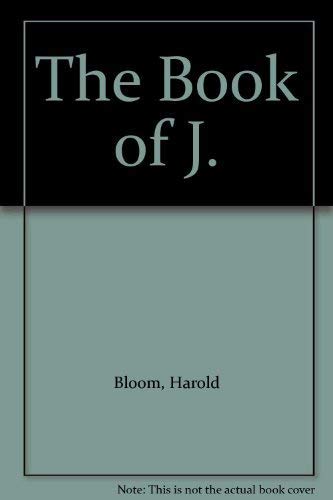bloom prof harold translated hebrew (1 Ergebnisse)
Produktart
- Alle Produktarten
- Bücher (1)
- Magazine & Zeitschriften
- Comics
- Noten
- Kunst, Grafik & Poster
- Fotografien
- Karten
-
Manuskripte &
Papierantiquitäten
Zustand
- Alle
- Neu
- Antiquarisch/Gebraucht
Einband
- alle Einbände
- Hardcover
- Softcover
Weitere Eigenschaften
- Erstausgabe
- Signiert
- Schutzumschlag
- Angebotsfoto
- Kein Print-on-Demand
Land des Verkäufers
Verkäuferbewertung
-
The Book of J
Verlag: Faber and Faber Ltd, London, 1991
ISBN 10: 0571161111ISBN 13: 9780571161119
Anbieter: The Print Room, Lilley nr Luton, Vereinigtes Königreich
Buch Erstausgabe
Hardcover. Zustand: Very Good. Zustand des Schutzumschlags: Very Good. Jacket by Irene von Treskow (illustrator). 1st Edition. First UK edition, first impression. Some slight edge wear and chipping to top and bottom of jacket and spine, corners slightly rubbed, some faint scratches to spine, some slight yellowing to page block. Not price clipped (£14.99), no inscriptions, internally clean tight and almost square, overall a vg+ copy for its age. 286pp. In this work of literary restoration, Harold Bloom and David Rosenberg recover a lost masterpiece by a nameless writer know as J, author of the oldest and most powerful stories in the Bible. Religious tradition ascribes authorship of the Pentateuch, the first five books of the Hebrew Bible or the Christian Old Testament, to Moses, but scholars agree that it is in fact a composite work consisting of texts by several different authors, woven together around 400 BCE by a master editor whom scholars know as the Redactor or R. The oldest of these texts, running through Genesis, Exodus and Numbers was written by the author whom scholars call J, probably in the 10th century BCE. For the first time, Bloom and Rosenberg lift the J text out of the surrounding material so that it stands as the classic it is. Bloom argues on aesthetic grounds that J is a writer of the stature of Homer, Shakespeare and Tolstoy, and on literary and psychological grounds that J was a woman, very likely a woman of the royal house living at the King Solomon's court. Paradoxically, on Bloom's interpretation, J is in no sense a religious writer. Rather she is an ironist with formidable powers of characterization, as revealed in her portrait of Adam, Joseph, Moses, Eve, Rebecca and Tamar. But J's finest creation is her Yahweh, an exuberant vitalist who is a far cry from the remote Jehovah superimposed by R and other editors. In Rosenberg's rendering, J's language is powerfully inventive, punning, playful and uncanny and her men and women are crafty and courageous. Quite a scarce book.


